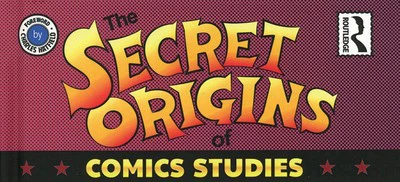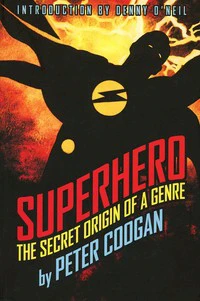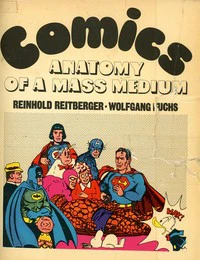The (Mostly) Unknown Instigators of Comics Studies

On the acknowledgements page of Superhero: The Secret Origin of a Genre (2006) Peter Coogan gives a thank you to: “My undergraduate advisor, Dr. Vera Camden, who asked me a fateful question when helping me fill in the ‘Area of Interest’ blank on a form for graduate school at Kent State in the English Department. I couldn’t settle on an area of academic interest, and these five words changed my life, “Why don’t you study comics?”

In the latter half of the twentieth century, when most of academia would have reacted to the idea of studying comics with laughter or condemnation, there were a few professors who allowed, or even encouraged, students to pursue a scholarly interest in comics.
Thomas J. Roberts sowed a number of seeds that contributed to the field of Comics Studies coming into full bloom. When the American comic book industry surged into being in the late 1930s Tom Roberts was the ideal reader, an imaginative twelve year-old boy. Roberts became a voracious reader of high and low culture alike, and his lifelong fascination with popular literature culminated in his 1990 book An Aesthetic of Junk Fiction. It was rather late in his forty year career teaching at the University of Connecticut that he began using his English 217 Studies in Literature and Culture class to teach about graphic novels, but Roberts still sired an impressive lineage of comics scholars. He couldn’t help but notice that two students in particular, Charles Hatfield and Gene Kannenberg, were passionate about comics. Roberts mentored Hatfield and Kannenberg, suggesting comics he thought they should read, giving them opportunities to guest lecture in his graphic novel class, and directing their comics-focused dissertations. Tom Roberts retired in 2003 and turned the graphic novel class over to another of his protégé’s, Brian Cremins (Hatfield et all, 2018).
If not for J. Donald Ragsdale I would not be writing about Comics Studies. I would written a doctoral dissertation about Native American rhetoric rather than about the rhetoric of comic book form, and it is very unlikely I would have become a comics scholar. JDR, as all his grad students called him, did not teach about comics, and I never knew if he even had an interest in comics, but he recognized my passion for the art form.
For the major paper in JDR’s course on the rhetoric of film (I don’t remember the exact title) I boldly (perhaps foolishly) decided to write about comic books rather than film. I was fascinated with how creators make use of the comics form, so it is not surprising that I became somewhat obsessed with Frank Miller and Klaus Janson’s early 1980s run on Daredevil. When I was taking JDR’s class in the in the mid-1980s, virtually everyone who wrote about comics relied on the language of film criticism. It made sense to me to write about the ways in which Miller and Janson’s Daredevil comics were cinematic.
JDR could have given me an F on the paper or told me to write another paper, this time about film. Instead, he seemed bemused. Perhaps the fact that my paper was three times the required length, even without the pictures, alerted him that I really cared about this topic.1 He gave me an A and wrote a note on the paper suggesting that, if I had not yet decided on a dissertation topic, I should consider expanding on my investigation of the rhetoric of comics form. My first reaction was “That’s Crazy! I can’t do that, can I?” But, the more I thought about it the more determined I became to give it a try.
As I worked on my dissertation proposal I discovered a number of histories and appreciations of pulp magazines, comic strips, and comic books had been published in the late 60s and early 70s. However, these were popular rather than scholarly works, and I worried that my dissertation committee was going to tell me that I could not possibly construct a dissertation on a foundation of “coffee-table books.” Then I came across Comics: Anatomy of a Mass Medium by Reinhold Reitberger and Worlgang Fuchs. The book had more analytical content than most of its competitors, was thoroughly indexed, had lots of endnotes for each chapter, and an extensive bibliography.

When, as a graduate student in my mid-twenties, I used the Reitberger and Fuchs book to justify my dissertation topic I did not realize they had been about that same age when they wrote the book. How did that happen?
Friedrich Georg Friedmann left his native Germany in 1933, after briefly being detained and questioned by the Gestapo. He emigrated to Italy, then England, and eventually the United States. In 1960, Friedmann, now with a wife and two children, returned to Germany. He became one of the pioneers of American Studies in Germany. It was as chair of the Department of American Cultural History at Ludwig-Maximilians-Universität that Friedmann recognized the enthusiasm Fuchs and Reitberger had for American comic books (Born in the mid-40s, they had grown up in the American- occupied zone), and recruited them to lead the colloquium “Comics: The Function of a ‘Popular Art’ within American Society.” Reitberger and Fuchs put so much effort into preparing for their colloquium sessions that professor Friedmann suggested they had a good start on a book about comics.2
I suspect the type of “origin story” presented here are fairly common for the senior faculty in the field of Comics Studies. Many comics scholars would not be in this field if not for an open-minded professor giving them permission or even encouragement to pursue to pursue their interests. Hopefully, some of you will share those experiences as comments on the unknown instigators post on The Center for Comics Studies Facebook page, and recognize more of the unknown instigators of Comics Studies.
- Randy Duncan
1 My obsession with Miller and Janson’s Daredevil run is on display (literally) in the Marvel: Universe of Super Heroes exhibition.
2 In a “sidebar” in The Secret Origins of Comics Studies Wolfgang Fuchs mistakenly calls the professor Werner Friedmann. As Wolfgang Fuchs explains: “First off, let me state that memory sometimes plays tricks on one. That was the case with my professor of American studies. His name actually was Friedrich Georg Friedmann and he was sort of the founder of the field of American studies at LMU in Munich. Werner Friedmann, on the other hand, was the founder of the journalism school in Munich. Having known both, they must have coalesced into one in my mind. Both were known only as Professor Friedmann, as no student interacted with professors on a first name level back then. Sorry, such things happen.”
Sources
Coogan, Peter M. Superhero: The Secret Origin of a Genre. Austin: MonkeyBrain Books, 2006.
Hatfield, Charles, et al. “Curious His Entire Life: Remembering Tom Roberts.” International Journal of Comic Art 20.1 (2018): 453-469.
Smith, Matthew J. and Randy Duncan. The Secret Origins of Comics Studies. New York: Routledge, 2017.